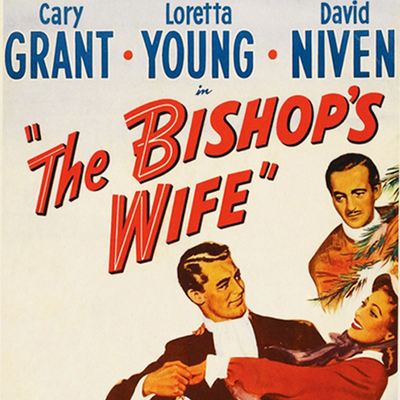The years immediately after World War Two did not turn on a dime into the long decade of postwar prosperity in America and the West. There were labour problems, political battles, the problem of turning soldiers back into civilians and a war economy back into a peacetime one. And there was the vast social unease and trauma after a war that confirmed that we were capable of anything, including the worst things imaginable.
My previous Christmas movie columns have been romances alternating with comedy or drama – pictures like Holiday Affair (1949) and Remember the Night (1940), where the holidays provide a setting and a set of peculiar obstacles in the way of two people falling in love. This year's Christmas pick is a much more high-minded affair, from those uneasy postwar years.
The Bishop's Wife premiered in New York City at the end of 1947 and went into general release in February of the new year. It was nominated for five Oscars including best picture, director, film editing and score, and won for best sound recording. It was the film Cary Grant made between The Bachelor and the Bobby-Soxer and Mr. Blandings Builds His Dream House, and was remade in 1996 as The Preacher's Wife with Denzel Washington in Grant's role.
The film begins in a city – not a big, recognizable one like New York or Chicago but some mid-sized one, probably Midwestern. (Exteriors were filmed in Minneapolis.) The camera picks out Grant wandering through soundstage holiday shopping crowds covered with soap flake snow, admiring the Christmas windows that were once a major attraction on any main street where the big department stores were located.
Our eye will always follow Cary Grant, and we get a sense that he has some special quality besides the good looks and radiant charisma that rendered him unique among Hollywood's golden age leading men. When a young mother's pram rolls away down the sidewalk while she holds up her older child to see the windows – a little echo of the Odessa Steps sequence in Battleship Potemkin – Grant suddenly appears out of nowhere to catch it before it rolls in front of a truck.
Grant is Dudley, and I'll fast forward through the next few scenes of exposition and let you know that he's an angel, with all the usual divine prerogatives and superpowers. There must have been an appetite for angels after the war; we had, after all, discovered that demons lived among us, in greater numbers than anyone could have anticipated.
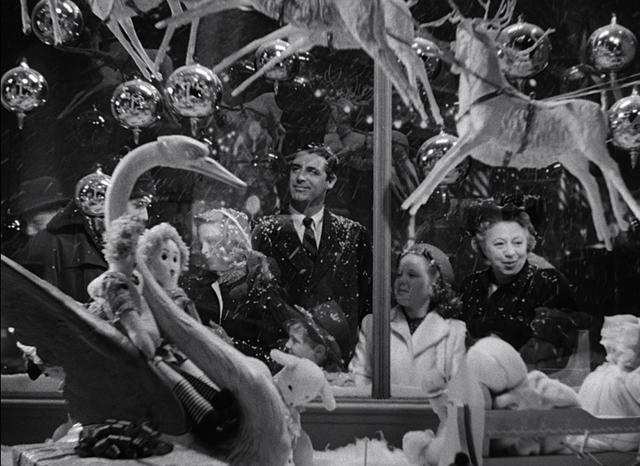
The Bishop's Wife came out just a year after Frank Capra's It's A Wonderful Life, though Grant's Dudley clearly comes from a more elite angelic cohort than Henry Travers' second class seraph Clarence. And Dudley is a sterner heavenly messenger; he's less interested in calming the hysterical mother when she thanks him than admonishing her to "Just don't let it happen again."
Dudley's mission among mortals is focused on Henry (David Niven), a young bishop – an Episcopalian, though the film is as coyly vague about Protestant denomination as any other Hollywood picture – with an equally young and attractive wife. And it is Julia (Loretta Young), the wife, who catches Dudley's eye first, as she makes her graceful way through the holiday crowds, stopping to admire a hat in a milliner's window.
Along the way, though he has to meet Prof. Wutheridge (Monty Wooley), a fusty academic who haggles with an Italian florist about the price of a mean little Christmas tree. Pretending to have known him from his time in Vienna, Dudley is able to establish for us that Henry is an old friend of the Professor though they don't see each other much anymore, since his promotion from pastor at St. Timothy's, an inner-city parish now fallen on hard times.

We finally meet Henry at his bishop's palace, in a meeting with Mrs. Hamilton (Gladys Cooper) and her entourage of acolytes who follow every imperious cue given by the rich widow. Mrs. Hamilton sits at the centre of the city's social elite; she's responsible for Henry's promotion and is demanding that a memorial to her late husband should be central to the cathedral that Henry is trying to build.
Building this cathedral is the focus of Henry's life as a prelate, at the expense of his flock and friendships and his relationship with Julia and daughter Debby (Karolyn Grimes). In a moment of desperation he had pleaded with God for guidance, and Dudley tells him that because his virtue was acknowledged his prayer was answered in the form of an angel tasked with helping Henry overcome the obstacles troubling him.
The drama of The Bishop's Wife centres around Henry's obsession with his cathedral, which is blinding him to what's truly valuable as both priest and a man, and the film's soft touch lets you ignore the inference that money and social influence are as damaging to his Church in general as they are to the man tasked to lead one of its urban outposts. You can ignore it, but that doesn't mean it isn't there.
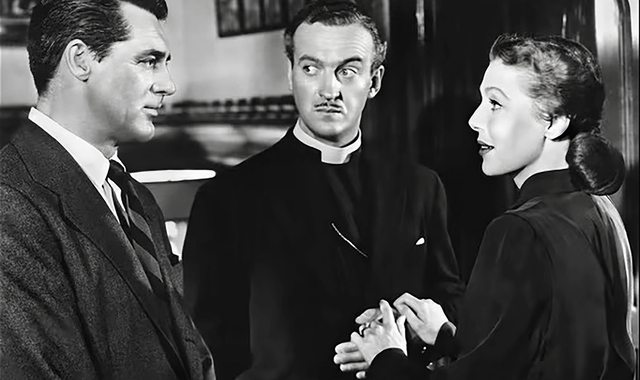
Pierre Berton was a Canadian journalist and author who was once a major celebrity here, though he had the great misfortune to live long enough to see his influence and reputation wane as the country he wrote about obsessively transformed itself into a less hospitable place for someone like Berton. In 1963 he was commissioned by the Anglican Church of Canada (the sub-Arctic cousins of the Episcopalians) to write a book that became a controversy and a bestseller.
The Comfortable Pew came out in 1965 and while it was controversial at the time, today it reads like reports from a battle fought long ago, whose outcome looks in hindsight like a foregone conclusion. Berton writes about how "'success' in business and social terms has all too often been the real gospel of the Church."
"A successful church is like a successful business. If its membership is growing, its budget growing and its program growing, then it is said to be 'progressing.' The Church existed for three centuries without the need for building programs; but a church today without an expensive edifice is becoming unthinkable in the major denominations. Since pre-Renaissance times, the spectacle of a costly and ornate cathedral rising above the most squalid slums has been one of the continuing and paradoxical images of Christianity."
It would seem that the people who made The Bishop's Wife anticipated Berton's criticism nearly two decades in advance. The story is based on a 1928 novella by Robert Nathan, a poet, novelist and sometime screenwriter (he wrote The Clock (1945), recently reviewed here) from a family that included poet Emma Lazarus and Supreme Court justice Benjamin Cardozo.
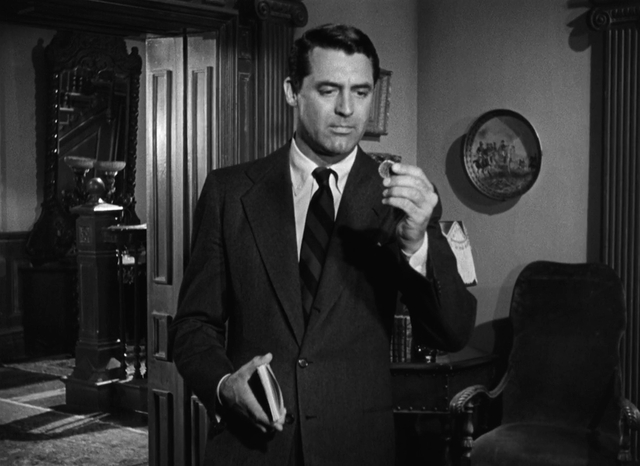
The screenplay for the film was written by Leonardo Bercovici (who also adapted Nathan's Portrait of Jennie into a 1948 picture starring Jennifer Jones and Joseph Cotten) and the playwright and Algonquin Round Table member Robert E. Sherwood, author of Waterloo Bridge, The Petrified Forest, Idiot's Delight and the screenplay for The Best Years of Our Lives. The script was punched up after dismal preview screenings with uncredited rewrites by none other than Billy Wilder and Charles Brackett.
Producer Sam Goldwyn replaced the original director, the prolific but unremembered William A. Seiter, with Henry Koster, a refugee from Hitler's Germany who discovered Abbott and Costello and directed Deanna Durbin in several pictures that saved Universal from bankruptcy. Koster was a reliable Hollywood pro who would go on to make films like Harvey (1950), The Robe (1953), Flower Drum Song (1961) and The Singing Nun (1966).
(Koster made a notable if probably unintentional specialty in religious and biblical pictures; besides The Bishop's Wife, The Singing Nun and The Robe, he also directed Come to the Stable (1949) with Loretta Young in a nun's habit, A Man Called Peter (1955) and The Story of Ruth (1960). But that probably has more to do with how much more common films with religious themes were before the late '60s.)
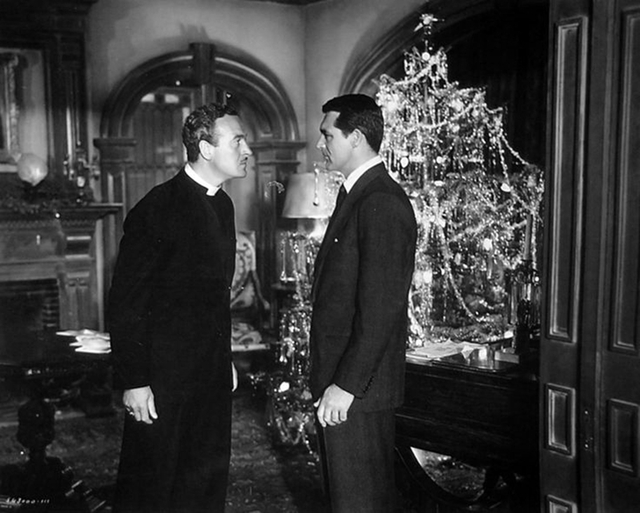
David Niven was originally meant to play the angel Dudley, with Dana Andrews as Henry and Teresa Wright as Julia, but when Wright became pregnant and left the picture, Andrews was lent to RKO in a trade for Loretta Young. Grant was approached to play the bishop but his star power was such that when he said he preferred the role of the angel Niven was swapped out.
I have a hard time imagining that the film would have been as successful with its original cast. Grant had hit his stride as a leading man years earlier with Topper, The Awful Truth and Bringing up Baby, and it would arguably continue until That Touch of Mink and Charade. Onscreen at least, he had the closest thing to a charmed life as any man in Hollywood, then or now.
Dudley is an angel, gifted with divine powers. He's capable of miracles, as he admits to Henry when the confused clergyman struggles with the identity of the handsome man who's just insinuated himself into his life. He could, for instance, simply build Henry's cathedral with a wave of his hand, much as he stops cars, straightens the bishop's files and decorates the Christmas tree in the parlour.
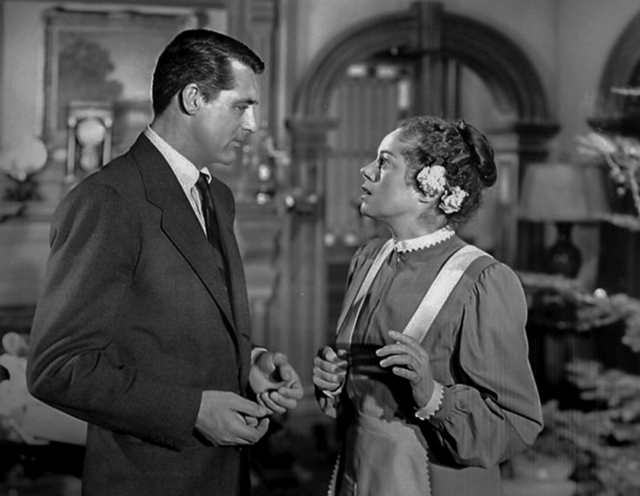
But the real superpower of Cary Grant's angel is his undeniable appeal to everyone he meets, and especially the women, including Julia, Mrs. Hamilton and her retinue, Matilda the housekeeper (Elsa Lanchester) and Henry's secretary Mildred (Sara Haden). Koster makes sure we can't miss this with a scene where Dudley sits on the floor telling a story to Henry and Julia's daughter, which draws all the women in the house like moths to a kerosene lantern.
Grant's nearly supernatural sex appeal was so obvious that his introduction to women onscreen was often done with a double take, and it was the basis for gags in pictures all the way from Topper through North by Northwest. It's hard not to imagine that an angel wouldn't have fun with the powers gifted by their divine state, much as it's rare not to presume that men played by Cary Grant onscreen didn't enjoy inhabiting the witty, confident, graceful and impeccably tailored vehicle who portrayed them.
Grant's stardom has abided enough to inspire Archie, a new four-part biographical miniseries produced by the streaming channel Britbox and based on the memoir of his second-last wife, actress Dyan Cannon. Played by a quartet of actors but mostly by Jason Isaacs in a distracting orange spray tan, it introduces us to Grant as he enters the last decade of his onscreen career, and at the end of his marriage to his third wife, Betsy Drake.
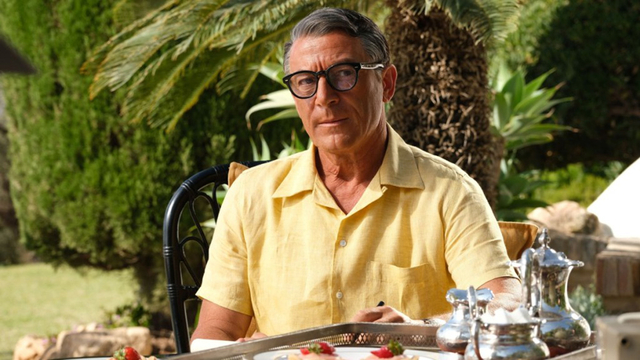
The series flashes across decades, back to Grant's impoverished childhood as Archie Leach in Bristol, and forward to the aged Grant on tour with A Conversation with Cary Grant, a one-man show where he simply sat onstage, showed clips and let an admiring audience listen to his stories and ask him questions.
The series doesn't really offer many revelations about Grant. His awful childhood is examined, with an utter bastard of a father and a mentally unstable mother. With this kind of beginning, it's no surprise that the young Archie devotes all his energy to escape – from Bristol to America as an acrobat, and into a wholly invented persona complete with its own idiosyncratic accent as Archie transforms into Cary alone at night in his rented New York digs.
There are the usual historical oopsies, most of whom will only bother obsessives (like the Ford Mustang Cannon is driving when she meets Grant in 1961, and which would not be in production for another three years.) The rumours about Grant's sexuality are addressed, albeit vaguely – "housemate" Randolph Scott makes a brief appearance, though not Australian costume designer Orry-Kelly.

What Archie shows us is a very damaged man who sought treatment later in life with LSD-assisted psychological analysis, but whose survival and career were mostly owed to the creation of this persona, this Cary Grant, who sold both the world and its creator an unattainable ideal.
Even when he's at his worst as a gaslighting, controlling, emotionally abusive husband (he gives away Cannon's dog when she's in the hospital giving birth!) he can still draw on apparently bottomless reserves of charm, sustaining the doomed marriage long past any viable point, and repairing his relationship with ex-wife Cannon at least enough to become a loving father. (The series was executive produced by Cannon and their daughter Jennifer Grant.)
The fact is that Cary Grant is scarcely plausible as a man, but he's an easy sell as an angel. That Young's Julia will have feelings for this charming, attentive and attractive man is inevitable, but the gentle twist is when Dudley realizes he wants to return those feelings, even going so far as to infer as much to Henry, taunting him by saying that he'd taken advantage of the bishop's misguided focus on fundraising for his cathedral to "represent you with your wife."
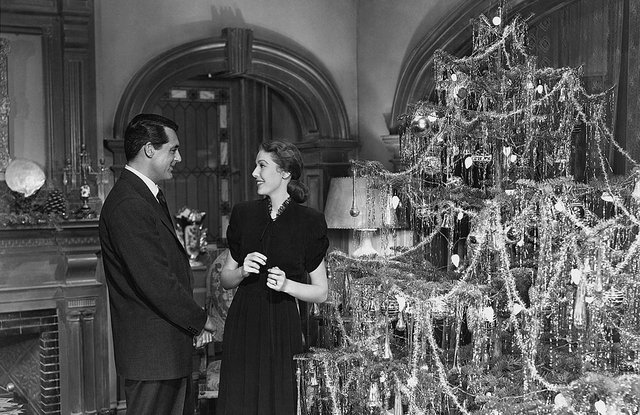
At the end the picture anticipates a film like Wim Wenders' Wings of Desire (1987) by imagining how guardian angels tasked with overseeing worldly events might start envying the powerful if fleeting emotions felt by mortals, and contemplate going AWOL from their seraphic state to share in them, if only for the briefest moment in an eternity. As a conceit it's hard not to regard as pure projection; a human need to consider the most intense extremes of our emotional lives as imbued with rare and immense cosmic value.
It's a trope that repeats over and over in stories where we imagine our encounters with both heavenly beings and advanced alien civilizations. (And which are, ultimately, really just the same stories.)
As I mentioned, The Bishop's Wife didn't do well in previews, necessitating script doctoring by Wilder and Brackett and re-shoots. Even when released it was slow to get traction with audiences, and Goldwyn went so far as to re-title it in some markets as Cary and the Bishop's Wife, hoping that the faintly smutty suggestion in the new title would banish the perception that it was a somber picture about religion.
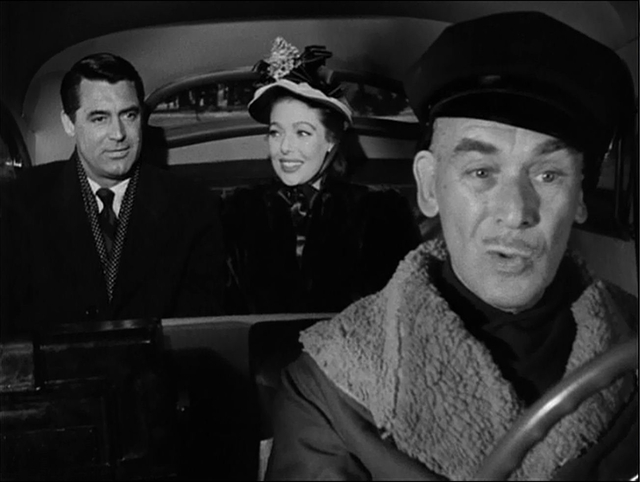
Lowbrows drawn to the theatres from beer parlours tempted by the nudging innuendo of the new title would have been disappointed nonetheless. The physical highlight of any romance between Grant and Young happens on a skating rink, accompanied by a third wheel – Sylvester, a taxi driver played by James Gleason, who's gifted with a figure skater's talent with a nod from Dudley.
They confront their emotions chastely, Dudley takes Julia's hint with angelic forbearance, and the film ends with Henry reading a sermon written by the now-forgotten Dudley in the pulpit on Christmas Eve at St. Timothy's, still run-down but with suddenly full pews that include Wooley's Professor Wutheridge, his atheism shaken by his encounter with Dudley.
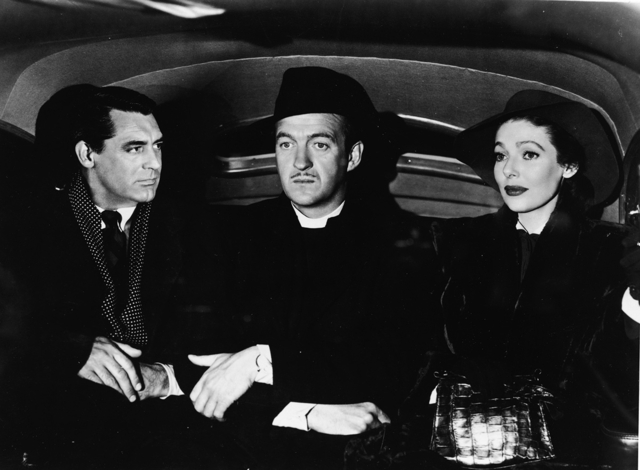
When it came time to remake the picture, the bishop obsessed with building a cathedral was transformed into a Baptist minister trying to save his struggling inner city church from Mr. Hamilton, a real estate developer played by Gregory Hines. Penny Marshall's film was scored with gospel music and no less than Whitney Houston took the role of Julia. (The soundtrack album tops all-time records for sales of gospel records.)
Denzel Washington was as inspired a choice for the role of Dudley as you could imagine at the time. A non-gospel remake might at different times have starred George Clooney or Brad Pitt. (Pitt would play an angel of sorts – Death – in Meet Joe Black.)
But the part remains the perfect one for Grant, during his long zenith at the top of the marquee, and at a time when American moviegoers could conceive of a return to normalcy and sanity achieved through faith and charity and family. It's an ideal that feels as impossible now as any man measuring up to the unreachable standard set by the avatar created by Archie Leach in a moment of desperation and longing.
Mark Steyn Club members can let Rick know what they think by logging in and sharing in the comments below, as access to the comments section is one of many benefits that comes along with membership in the Mark Steyn Club.

